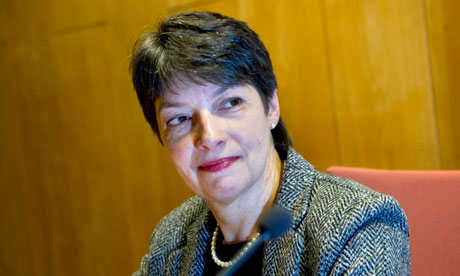 |
| This is what patriarchy looks like, in religious garb. It dresses up in many ways, usually in variations of sheep's clothing. But just look for the women's blood on the teeth (or on the fist, or in the courtroom, or on the street, or in the hotel room, or in the home). Then you'll know what's underneath the nifty attire. The image is from here. |
What follows is at The Guardian. You may click on the title to link back. I have posted a reply to the author and two male commenters, who display alarming ignorance about what women and girls endure at the hands and institutions of men. That comment appears below.
Radical feminism: what it is and why we're afraid of it
Calling the chief prosecutor in the Assange case a 'malicious radical feminist' reflects our misunderstanding of feminism
 |
But what exactly is radical feminism? If popular attitudes to feminism are anything to go by, it's clearly something pretty terrifying.
Research suggests that, in the popular imagination, the feminist – and the radical feminist in particular – is seen as full of irrational vitriol towards all men, probably a lesbian and certainly not likely to be found browsing in Claire's Accessories. As an academic working on issues concerning gender and politics, I've had the good fortune of meeting lots of inspiring feminist women – and men – but despite searching I've yet to locate a feminist matching that particular description. Perhaps I haven't looked hard enough. A more likely possibility is that the popular insistence that radical feminists – and often by implication feminists in general – are all man-haters reflects wider misunderstandings about the history of feminism and its impact on contemporary gender relations.
So what is radical feminism? Historically, radical feminism was a specific strand of the feminist movement that emerged in Europe and North America in the late 1960s. Distinctive to this strand was its emphasis on the role of male violence against women in the creation and maintenance of gender inequality (as argued by the likes of Susan Brownmiller, Andrea Dworkin and
However, in Britain at least, radical feminism has never been particularly dominant, partly because – in the eyes of many socialist and postcolonial feminists – it has been insufficiently attentive to the intersections between gender inequality and other categories, such as race and class. So Rod Liddle's peddling of the tiresome rightwing idea that radical feminism has destroyed the family, along with Dominic Raab's assault on "feminist bigotry" and the Vatican's efforts to address "distortions" caused by radical feminism, rest on at least two implausible assumptions. First, they reduce feminism to a horrifying caricature that never really existed and second, they make the frankly bizarre suggestion that radical feminism is the dominant ideology of our times. It would seem that not only do these radical feminists commit the outrage of not wearing makeup, but they use the time this frees up to consolidate their world domination. Or an alternative explanation might be that these are the paranoid anxieties of fearful anti-feminists.
Their fear is not totally misplaced, for radical feminism has undoubtedly had some success. Fortunately for Dominic Raab, world domination is not one of them. Three decades ago, the notion that rape and domestic violence are pressing political issues rather than trivialities, or that men should play an active role in childcare, would have been seen by many as radical and dangerous. Today, thanks to the influence of the insights of diverse strands of feminism (including, but not limited to, radical feminism), these ideas have seeped into the mainstream. Despite this, genuine gender equality can seem distant, but many groups and individuals continue to push in the right direction.
Although the rights and wrongs of the Assange affair are at this stage far from clear, whenever accusations of "man-hating feminism" enter into a debate, our suspicions should be immediately aroused. For more often than not, the temptation to close down debate by tossing around accusations of man-hating radical feminism is caused not by a fear of debate, but by the deeper fear that feminism might actually have something important to say.
Julian's response:
@Jonathan - Thanks for writing this. I'll add that the oldest still-active radical feminist group in the world is not English-speaking or Western. It is RAWA, in Afghanistan. Radical feminism is an English term that applies to actions of women around the world who resist and challenge men's class-based right (wrong) and self-appointed entitlements to dominate women sexually and socially. Intersectionality has always been part of Radical Feminism. Audre Lorde, Alice Walker, bell hooks, and many other radical feminists, were making those connections from the early 1970s onward. The essays on intersectionality were written in the 1970s. See "Sister Outsider", by Lorde. Please don't invisibilise this radical feminist work or promote the idea that all radical feminists were and are white. Also, "radical feminism" isn't era-specific. They've been working to stop men's terrorism of women all along. They just weren't allowed any access to dominant media and only got trashed by men's media. See "Backlash" by Susan Faludi for all the grim details on the U.S. front.
@ xenium1 (9 February 2011 9:35AM) - I trust you've never had a man systematically rape you, or that you've never "chosen" to have sex with a man because you feared he would kill you if you don't let him. I gather you're not, right now, living with a man called "my husband" who, as a form of control and domination, breaks bones in your face with his fists and causes you to miscarry by beating your belly. I trust you've never been a girl, white or of color, trafficked as a sex slave. I trust men don't pay you to do whatever they want to you, including ejaculating on your face, or in your body without a condom on--because he likes it like that. Your analysis leaves a lot of reality out of the picture. Your male privilege is showing in your reduction of oppression to white male-created economic systems.
@CordwainerBird (9 February 2011 9:43AM) - Typical liberalism. You remove statements from political reality and pretend you're making a solid point. Muslims are currently oppressed by white Christian men, who war against them ruthlessly, with NATO support. Men war against women, ignoring all international human rights laws. Your analogy is wrong. Julie, in that analogy, is Muslim. You, dear sir, in this example, are Christian, white, Western, and male. For you to make such comments against people YOUR people are destroying would be a grotesquely insensitive and obnoxious thing to do. Julie Bindel is of the population of the group men terrorise. She is fully entitled to hate whomever she wishes among the men who do the terrorising. Please own and be responsible with your political structural location and please post comments that don't pretend we're all living in some la-la land where "all hate is equal". It isn't. Men's hatred of women in institutionalised into laws which make most forms of rape invisible, protect husband-fathers taking children from women if the women are beaten by the husband-fathers, because the women are then not deemed to be "fit mothers" because they've been so seriously battered. I hope you get the bitter irony of such laws, strongly enforced by men much to the physical, emotional, and spiritual detriment of women and children. Women's hatred of men shows up in which institutions, exactly? And what forms of violence against men's bodies does that hatred Julie speaks of take? And where, exactly, is that particular form of economic exploitation that is sexual, used by women to rent and purchase boys globally? And which political and religious organisations keep men from holding ALL the top positions, only ever allowing women to rule?

Bless you Julian, and the man who wrote the article that was much needed. I was disgusted yesterday, I posted this a male (who i thought was a feminist) told me that I was bougeious and radical feminism has no place in socialism. He also defends assange.
ReplyDeleteI am glad more people are standing up for radical feminists. I felt upset when yet another big "powerful" dude (like the lawyer) came down and negatively stereotyped radical feminists as men haters.
Great responses to all of the comments. I will share this asap!
Hi Owl Eyes!
ReplyDeleteYou're so welcome. I'm glad the timing was good in terms of that dickhead "socialist" calling you names. He might be interested--or not--to read the whole of the first section of Catharine A. MacKinnon's book, Toward A Feminist Theory of the State, in which she identifies with incisive precision, what's missing from Marx and Engel's analysis when it comes to gender. And, it appears, no "Socialist" or "Communist" men have bothered to correct this since the time her book was publised. And few men take the reality of women's subordination to men as seriously as the dictatorship of the terribly and globally white male dominant bourgeoisie.
Hatred of radical feminists is endemic and not limited to just the US because it is rife here in the UK. Scapegoating radical feminists is par for the course and not forgetting the retired Judge had to admit she didn't even know the Swedish prosecutor but was simply repeating hearsay. But then malestream media ignores that fact.
ReplyDeleteRadical feminists have always been demonised and that is because we refuse to remain silent and pander to men. Yes I know not all radical feminists were/are white but malestream media continues to erase radical feminism.
As always the issue is about men challenging other men and men fighting other men for the other men's socio-economic power as well as of course maintaining male domination over all women. That is why Messrs. Marx and Engels didn't address the issue of male domination over women because only males are the default human and the male vision is myopic and firmly fixed on other males.
Sometimes the utter stupidity of MRAs is astounding because I was not aware radical feminists held so much power that we can murder and rape so many men whilst malestream media does not report such violent male hatred being committed by radical feminists. Still lies are always easily more accepted than the truth which is why those MRAS were hysterically engaged in repeating lies. Repeat lies often enough and individuals will believe them.
Yes, Jennifer.
ReplyDeleteEngels made an attempt, but failed, as MacKinnon details.
And, regarding the last point, if dominant media repeats lies about feminism, including radical feminists, then whole societies believe the lies and accept them as The Truth. Sadly, for girls and women seeking liberation. Gladly, by men who adore being able to dominate girls and women.
We often wonder why many women are so terribly brainwashed into believing feminism is really evil. With messages like this it is no wonder so many women reject feminism and believe men are getting a raw deal.
ReplyDeleteThese types of messages cause the oppressed to justify their oppression and start standing up for their oppressor and granting their oppressor more privileges and power.
More than ever we should be educating women and girls about the truth.
As for Assange, is he getting a raw deal? If the man is a rapist the fact that he is now famous should not be used to declare his innocents and that vengeful feminists are out to get him. What message is the Assange case sending out to our sisters? That rape is not rape, that it is just rotten feminists trying to bring down a great man?
If this is the case, it is no surprise by the number of women who reject feminism.